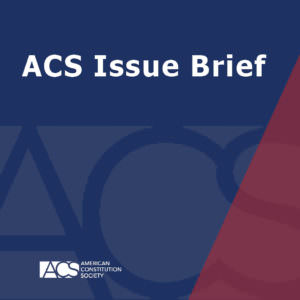On Secrecy and Transparency: Thoughts for Congress and a New Administration
Edward H. Levi Distinguished Service Professor, University of Chicago
 ACS is pleased to distribute an Issue Brief by Geoffrey R. Stone, Edward H. Levi Distinguished Service Professor at the University of Chicago, entitled "On Secrecy and Transparency: Thoughts for Congress and a New Administration." In this Issue Brief, Professor Stone examines government secrecy and transparency against the backdrop of the actions of President George W. Bush's Administration in the wake of the September 11, 2001 attacks. As Professor Stone explains, "[t]o achieve an unprecedented level of secrecy, the Bush Administration has promulgated secret policies, narrowly interpreted the Freedom of Information Act, broadly interpreted its power to classify government documents, closed deportation proceedings from public view, redacted vast quantities of "sensitive" information from government documents and websites, fired and otherwise punished government whistleblowers, jailed journalists for refusing to disclose confidential sources, threatened to prosecute the press for publishing confidential information, and aggressively invoked both executive immunity and the state secrets doctrine." Professor Stone considers valid national security concerns that compel government secrecy, but weighs them against concerns that compel transparency, such as the need in a democracy for citizens to know what their representatives are doing and be able to hold them politically accountable. He reminds readers that "[a]lthough the danger to the United States is quite real and not to be underestimated, so too is the danger of an overly aggressive insistence on secrecy." Evaluating complicated competing interests, Professor Stone considers solutions and concludes with recommendations, including: (1) curbing the authority of the executive to classify information solely because its disclosure has the potential to harm national security; (2) providing greater protection for national security whistleblowers, with express protection for public employees who disclose unconstitutional or otherwise unlawful government actions; (3) clarifying and limiting the use of the state secrets privilege; and (4) establishing a qualified journalist-source privilege.
ACS is pleased to distribute an Issue Brief by Geoffrey R. Stone, Edward H. Levi Distinguished Service Professor at the University of Chicago, entitled "On Secrecy and Transparency: Thoughts for Congress and a New Administration." In this Issue Brief, Professor Stone examines government secrecy and transparency against the backdrop of the actions of President George W. Bush's Administration in the wake of the September 11, 2001 attacks. As Professor Stone explains, "[t]o achieve an unprecedented level of secrecy, the Bush Administration has promulgated secret policies, narrowly interpreted the Freedom of Information Act, broadly interpreted its power to classify government documents, closed deportation proceedings from public view, redacted vast quantities of "sensitive" information from government documents and websites, fired and otherwise punished government whistleblowers, jailed journalists for refusing to disclose confidential sources, threatened to prosecute the press for publishing confidential information, and aggressively invoked both executive immunity and the state secrets doctrine." Professor Stone considers valid national security concerns that compel government secrecy, but weighs them against concerns that compel transparency, such as the need in a democracy for citizens to know what their representatives are doing and be able to hold them politically accountable. He reminds readers that "[a]lthough the danger to the United States is quite real and not to be underestimated, so too is the danger of an overly aggressive insistence on secrecy." Evaluating complicated competing interests, Professor Stone considers solutions and concludes with recommendations, including: (1) curbing the authority of the executive to classify information solely because its disclosure has the potential to harm national security; (2) providing greater protection for national security whistleblowers, with express protection for public employees who disclose unconstitutional or otherwise unlawful government actions; (3) clarifying and limiting the use of the state secrets privilege; and (4) establishing a qualified journalist-source privilege.
Read the full Issue Brief here: Geoff_Stone_Issue_Brief
By Geoffrey R. Stone
